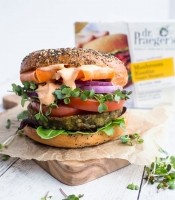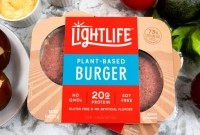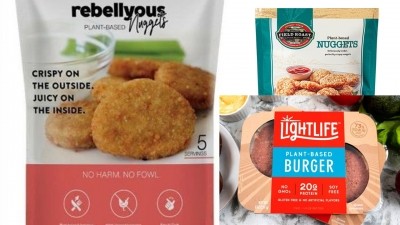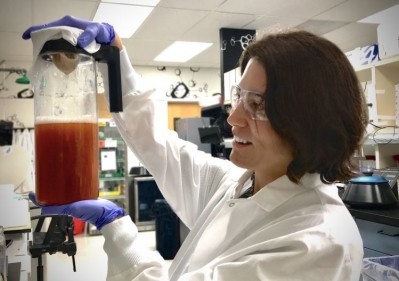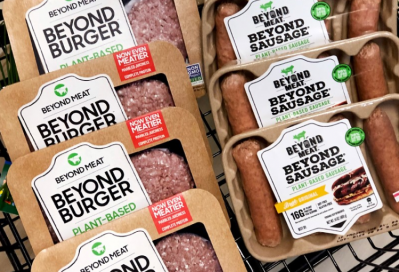How is coronavirus impacting plant-based meat? Impossible Foods, Lightlife, Tofurky, Meatless Farm Co, Dr. Praeger's, weigh in
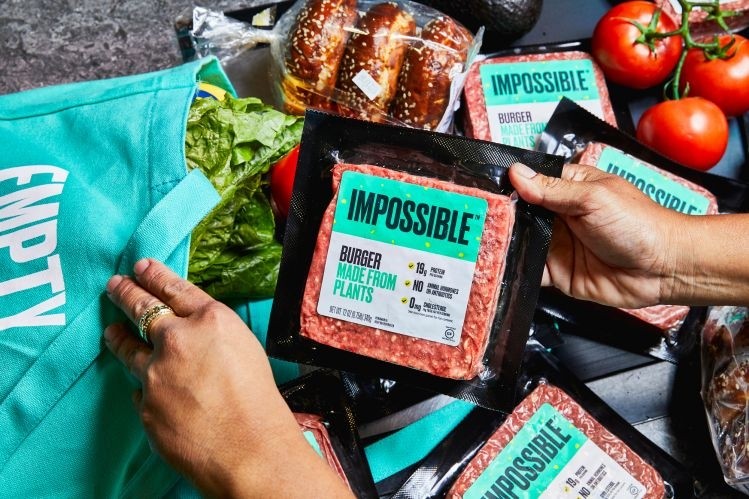
According to Nielsen data tracking dollar sales in US food retail (total food – all outlets combined excluding c-stores), sales of fresh meat alternatives were already growing at 158.3% year-on-year in the week ending February 29 (i.e. just before shoppers started ‘surge’ buying).
However, sales rose dramatically thereafter, with year-on-year growth peaking in the week to March 21, mirroring what we’ve seen in many other categories:
Fresh meat alternatives:
- +255.3% for the week ending 3/28/20 (vs same week the previous year)
- +454.1% for the week ending 3/21/20
- +279.8% for the week ending 3/14/20
- +158.3% for the week ending 2/29/20
Fully-cooked meat alternatives:
- +50.2% for the week ending 3/28/20 (vs. same week previous year)
- +128.6% for the week ending 3/21/20
- +84.6% for the week ending 3/14/20
- +20.5% for the week ending 2/29
Regular meat sales also surged in March, with shoppers stocking up on fresh meat (+53.2% for the week ending 3/28/20, +100% for the week ending 3/21/20); processed meats (+54.3% for the week ending 3/28/20, +127.2% for the week ending 3/21/20); and fully-cooked meats (+19.9% for the week ending 3/28/20, +73.8% for the week ending 3/21/20).
Impossible Foods: ‘Numerous restaurants are doing thoughtful pivots to retail’
Impossible Foods, which closed a $500m funding round just before coronavirus hit, had been gearing up for a significant expansion in its restaurant and retail business this year, adding new manufacturing capacity and starting or expanding trials with major QSR outlets.
Unlike Beyond Meat – which has a more balanced channel mix of retail vs foodservice business – Impossible Foods began in the restaurant business, telling FoodNavigator-USA in early March that its products were available in around 17,000+ foodservice outlets, but just 150 retail outlets.
With many of those restaurants now either closed or selling far less than usual (via takeout/delivery/drive-through services) owing to the lockdown, the company has been working hard to pivot, said chief communications officer Rachel Konrad, who noted that the FDA had recently relaxed labeling rules such that product designed for foodservice could be re-directed to retail or direct to consumer operations.
“The FDA issued new guidance for restaurants to make it easier for them to sell their inventory directly to consumers,” she told FoodNavigator-USA.
“Numerous restaurants are doing thoughtful pivots to retail. A good example is Prairie in San Francisco, which created an online general store website where you can order inventory (everything from toilet paper to vodka to 5 Impossible Burger quarter-pounder patties for $18.75).”
‘Within hours of the new FDA guidelines, we began getting inbound inquiries from restaurant customers’
She added: “Within hours of the new FDA guidelines, we began getting inbound inquiries from restaurant customers, asking us for advice on what to do, and how to price Impossible Burger. Simply so we could quickly respond to this growing number of inbound inquiries, Impossible Foods sent out an email Tuesday night to our restaurant customers.”
This explained that, “You can sell Impossible Burger 5lb bricks, 1/4 lb patties, and 1/3 lb patties directly to your guests – all you need to do is print out and give them a copy of this PDF when you sell the product. The price is up to you.
“We’re also working to help your business by getting the word out. Share your info here so we can promote your restaurant on our social channels…”
Impossible Foods has also emailed fans asking if they would be interested in ordering Impossible Burgers directly from its website.
‘We will be announcing some big retail news later this month’
Asked about Impossible Foods’ roll-out at retail, Konrad said: “We have already seen a tremendous increase in retail demand in the 150 grocery stores that began selling the Impossible Burger last year. March was the #1 month ever for retail demand as people shift purchasing behavior from restaurants to groceries to cook at home. We will be announcing some big retail news later this month.”
From an operational perspective, she added, “thus far we have seen no fundamental disruptions to our supply chain due to COVID-19.”
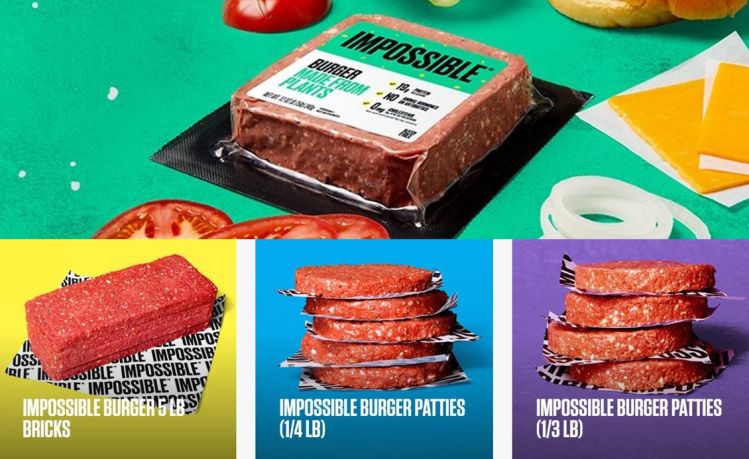
Could a recession dampen consumer enthusiasm for plant-based meat?
But what about the broader impact of the lockdown, and could the worsening economic outlook dampen consumer enthusiasm for plant-based meat?
Trendwatchers at Culinary Tides for example, predict that “the interest in faux meat will be one of the trends which COVID-19 will upend. It is clear from research that faux plant-based meats are consumed by meat eaters, not vegetarians, with curiosity being their driver.
"As sales numbers on these products continue to slide [it’s not clear what data is being referenced here], COVID-19 will push meat eaters back to animal protein at an accelerated pace…”
‘Transitioning away from eating animal products is one of the best ways to reduce the likelihood of future animal to human spillovers’
While it’s too early to say how a recession will impact the plant-based meat category, Konrad said she “respectfully and strongly” disagreed with Culinary Tides, adding that the current crisis may even accelerate the push towards plant-based eating as consumers start to question the role of industrialized animal agriculture in the spread of animal and human pandemics.
“COVID-19 appears to have infected humans starting in the wet markets selling live animals in China; that’s why China banned the consumption of wild animals in early March.
“Humans’ reliance on animals for food is a public health disaster, responsible for a disproportionate number of viruses and pandemics -- from the 1918 Spanish flu (from swine viruses) to the majority of human cases of influenza A (from live or dead infected poultry).
“Eating animals imparts risk of zoonotic outbreaks, by bringing wild animals in close proximity to humans via markets or via deforestation, and by creating ‘reservoirs’ for pathogens in the form of domesticated livestock. Transitioning away from eating animal products is one of the best ways to reduce the likelihood of future animal to human spillovers.”
‘Animal agriculture is an environmental disaster’
She added: “Our mission is to replace animals in the global food chain. Animal agriculture is an environmental disaster, accelerating biodiversity collapse, global warming and the climate crisis. Using animals as food is also a public health disaster. Our mission and the switch to a plant-based food system is more important than ever.”
‘We will certainly use our latest investment to fuel our retail growth’
As for the company’s more immediate prospects, she said: “In March, we announced a $500m funding round, bringing our total fundraising to $1.3bn since the company’s founding in 2011. This latest Series F round helps to ensure that Impossible Foods has the resources to accelerate growth and continue to thrive in a volatile macroeconomic environment, including the current COVID-19 pandemic.
“We will certainly use our latest investment to fuel our retail growth.”
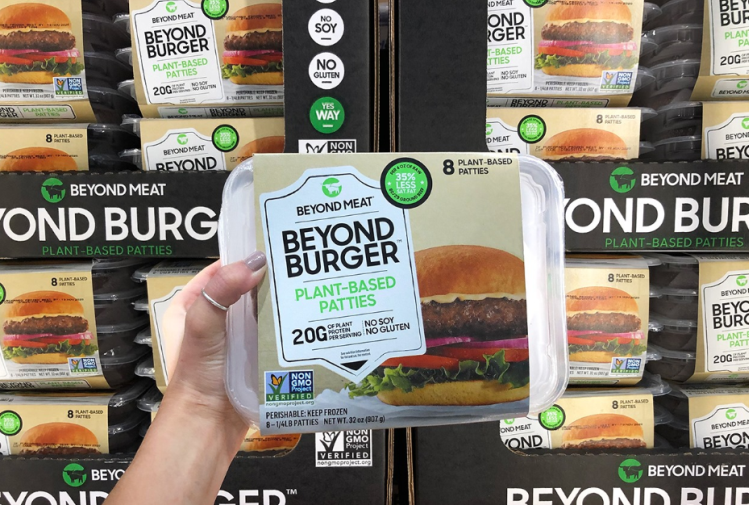
Beyond Meat: Feed a Million+
Beyond Meat did not immediately respond to a request for comment as some analysts downgraded the stock amid fears it could hurt near-term sales (as over half of its sales are into the foodservice channel) and delay overseas expansion plans, especially in China.
However, analysts at Bernstein noted that Beyond Meat's sales growth for week ending March 21 (Nielsen data) "surged to a whopping 478% YoY, which seems more than enough to offset the complete slump in sales the company is no doubt experiencing in the foodservice sector, which represents roughly half of the company's sales."
Right now, the company is working with partners to donate 1m+ Beyond Burgers to people in need (to food banks, hospitals, community centers and other organizations) as part of its Feed A Million+ pledge.
Tofurky: 'Our products will continue to be a weekly basket staple for conscious consumers'
Jaime Athos, CEO at plant-based brand Tofurky, said he was "adding more shifts, running more lines simultaneously and hiring/expediting training for short term staff in order to get more product out the door," to meet a surge in demand.
"Our purchase orders were up 50% over average this week. We do anticipate that ordering patterns will remain heightened over the course of the pandemic as American’s have narrowed their food consumption to at-home meals, without many restaurant options. Shoppers purchase patterns right now seem to be focused on proteins and things that can be frozen or have considerable shelf lives, all things that Tofurky products offer."
Should we enter a prolonged recession, he said, "Our products will continue to be a weekly basket staple for conscious consumers.
"We believe this COVID-19 pandemic will offer time for reflection and introspection around consumption. We see people getting creative while cooking at home, using this time to discover new products and lifestyle choices, then sharing them with friends and family, which only grows awareness for our category. Furthermore our products are positioned in both recipe development and price point as accessible and affordable."
However, innovation plans are being modified, he said, while the launch of a new plant-based cheese line under Tofurky's new sister brand Moocho, is likely to be delayed as onboarding new brands/products moves down retailer priority lists.
"Our retail partners have informed us they’re very focused on demand planning fulfillment of existing sku assortments. What this means is that they won’t likely have time or resources for shelf re-sets, new item introductions or promotions. They’re just working hard to get shelves re-stocked."
"During the past few weeks, we have certainly seen big spikes at most of our top retailers...
"Plant-based products have surpassed a trend and have become a staple in many people’s lives. Contrary to popular belief, we have actually seen plenty of consumer trial recently as people look to expand what the meals they can offer at home, and Dr. Praeger’s ensures that making good choices (even in tough times!) is easy. We are also seeing loyal customers continue to buy plant based products as it has become a staple in their diet.
"[However] a majority of imminent frozen shelf resets are on hold. We are currently awaiting firm updates on the launch of the newest Dr. Praeger’s authorized items through Fall, however we anticipate occasional new item cut ins to be issued prior to reset."
Larry Praeger, CEO, Dr. Praeger's Sensible Foods
"Like all food companies, there has been a significant uptick in demand for our retail products... One of the challenges has been managing delivery windows and fill rates to enable the best possible flow of product from our facilities to customers.
"Many of our retail customers are delaying shelf resets, appropriately so, to avoid face-to-face meetings or tastings. The great news is that we have strong distribution throughout North America across thousands of stores.
"And while plant-based protein has a higher price point than traditional animal products... we expect health and variety will continue to be important drivers of behavior for consumers. Plus, we know many balance animal protein products with plant-based products. Longer term, we could see prices decline as the supply chain for ingredients, such as pea protein, is more established."
Dan Curtin, president, Greenleaf Foods (Field Roast, LightLife)
Meatless Farm Co: 'We're targeting meat eaters so the texture has to be right, the flavor has to be right... but also the price'
At British brand The Meatless Farm Co, which entered the US market last August via a nationwide rollout with Whole Foods and has since added 200+ more stores pulling from UNFI and KeHE, US general manager Kasper Vesth acknowledges that onboarding new brands is not a top priority for retailers right now.
"The masterplan was for us to open up distribution in February and have a big push at Expo West, and obviously that is going to take a little bit longer, but on the positive side, we have plenty of food in the warehouse and good distribution, and we've seen an increase in sales in stores where we are available."
Right now, the product is being shipped over from the UK frozen, to be sold in retailers' refrigerated cases, with plans to produce locally via US co-packers temporarily on ice while we see how long the lockdown continues, said Vesth.
While he sees interest in plant-based foods continuing during an economic downturn, offering competitive prices will be important, said Vesth, who said The Meatless Farm Co products had more protein, more fiber, and less saturated fat than rivals [although sodium levels are higher] and a 'playful' brand image that resonated with younger shoppers.
"If you think about it, it's weird that a pound of plant-based beef is more expensive than a pound of [regular] beef, when you think how many pounds of plants are needed to feed the cows, but that will change. The long-term goal has to be that plant-based meat is the same price as regular meat, or less.
"We're targeting meat eaters so the texture has to be right, the flavor has to be right... but also the price."
